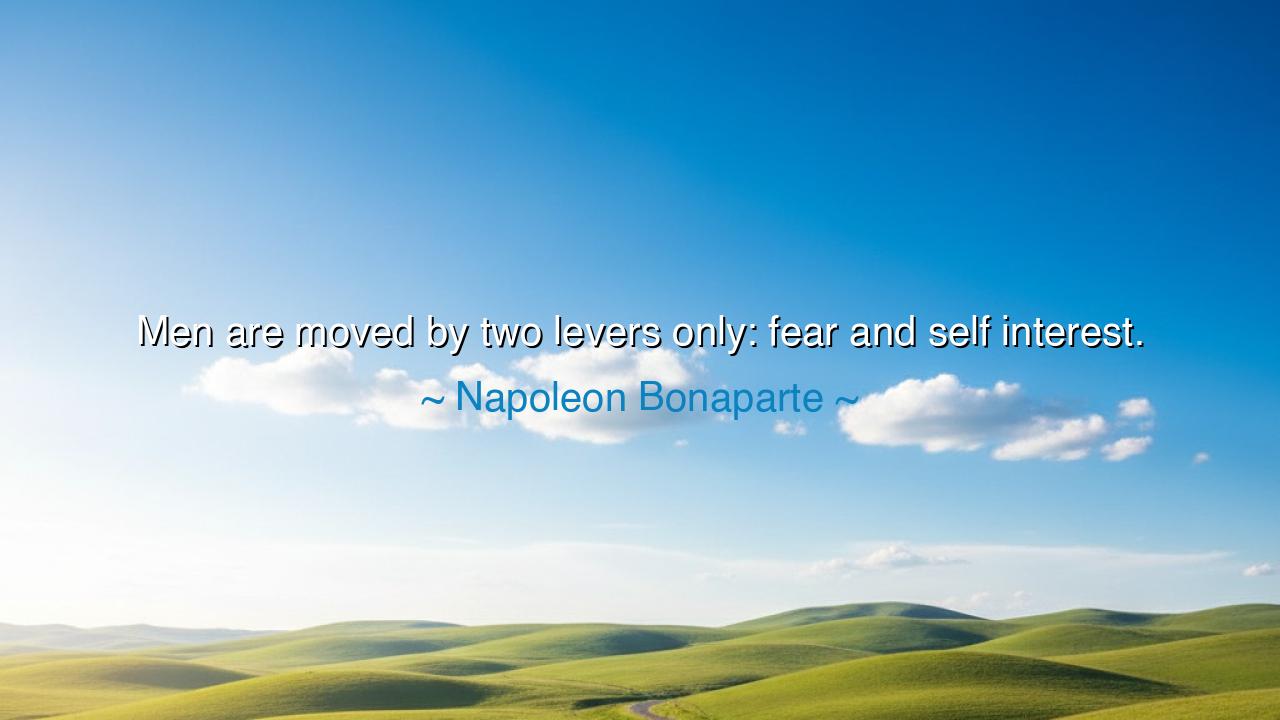
Men are moved by two levers only: fear and self interest.






Hear the voice of Napoleon Bonaparte, conqueror of Europe and master of men, who declared: “Men are moved by two levers only: fear and self-interest.” These words, though harsh, pierce to the heart of human nature. They reveal the hidden machinery by which rulers guide their subjects, generals lead their armies, and merchants sway their customers. Napoleon, who held vast multitudes under his command, knew well the fragile cords that bind men’s hearts to action. He names them fear and self-interest, and with these two levers, he raised and shattered empires.
The origin of this wisdom lies in the battlefield and the council chamber. For Napoleon did not study men as philosophers did, from the ivory towers of theory; he studied them in the mud of war, in the fires of revolution, in the councils where loyalty could shift with the winds. He saw that men would charge into cannon fire when driven by fear of disgrace, or when promised the reward of honor and spoils. He saw that lofty words of virtue meant little unless they touched these primal levers. His observation was not cynicism alone, but the testimony of one who lived among the extremes of human ambition and terror.
Consider the armies of Alexander the Great, who marched across continents. They followed him not only from devotion but because they feared the shame of desertion, and because each new conquest promised them land, gold, and glory. When Alexander’s victories faltered and rewards grew scarce, discontent rose, and his soldiers longed to return home. Thus history confirms Napoleon’s truth: men endure hardship and sacrifice not simply from ideals, but when their fear or their self-interest is stirred.
And think of the rulers of Rome. The Caesars held the populace in check through bread and circuses: bread to feed their interest, circuses to distract their fears. They understood that power is fragile if not built upon the recognition of what moves men most deeply. The Republic fell, the Empire rose, but the levers remained the same. Fear of the lash and hunger for reward have guided legions, senators, and citizens alike.
Yet let us not despair at this seeming reduction of human nature. Napoleon’s words, though stern, are also a call to wisdom. To understand that men are moved by fear and self-interest is to understand how to govern them wisely. A leader must temper fear with justice, lest it turn to hatred, and must channel self-interest into noble service, lest it decay into greed. The levers themselves are not evil; it is their use that determines whether they lead to tyranny or to greatness.
The lesson for us, therefore, is clear: examine what moves you. Are you ruled by fear, shrinking from risk, avoiding truth? Are you driven only by self-interest, blind to the needs of others? Or can you, by wisdom, transform fear into courage, and self-interest into service? For the greatest men and women are not those who deny these forces, but those who master them, harnessing them toward the good.
Therefore, O listener, do not be naive about the nature of man. Recognize the levers that move you and others. Use fear not as a chain, but as a warning that guards you from folly. Use self-interest not as a tyrant, but as a guide that can be yoked to higher purpose. For while Napoleon saw these as the chief levers of power, you may learn to wield them differently—not to dominate, but to elevate, not to enslave, but to liberate.
Thus, carry this wisdom as both caution and counsel: men are easily swayed by fear and self-interest, but the wise turn these forces into stepping stones for greater virtue. And remember—though these levers may move men, it is character, justice, and vision that make them follow not from compulsion, but from love. That, above all, is the lever of true greatness.






AAdministratorAdministrator
Welcome, honored guests. Please leave a comment, we will respond soon